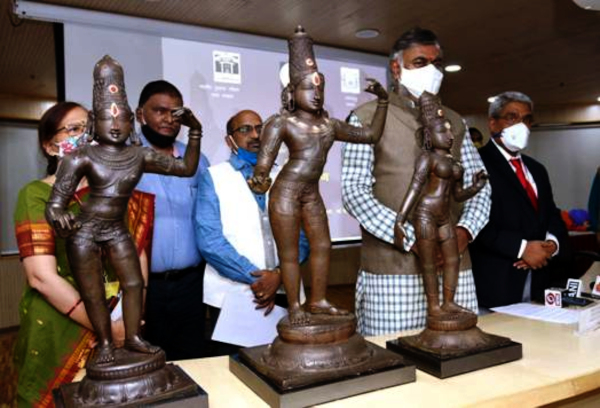New Delhi: The Archaeological Survey of India (ASI) has retrieved as many as 36 antiquities from foreign countries over the last five years, according to the Union Ministry of Culture and Tourism.
Among the items recovered were metal idols of Ram, Sita and Laxman, a stone sculpture of Nataraj, stone sculptures of Brahma and Brahamani, a Bodhisattva head, a ‘Dancing Shiva’, a metal Ganesh idol and a Sri Devi artefact from the Chola period.
The information was shared by Minister of State for Culture and Tourism Prahlad Patel in Parliament Tuesday. In reply to a question raised by Rajya Sabha member Manas Ranjan Bhunia, Patel said all the antiques recovered were given voluntarily by the museums and related authorities of three countries, including the US, Australia and the UK.
“All efforts are being taken by the Archaeological Survey of India to retrieve the antiquities which have been smuggled out of the country. During the last five years, 36 antiquities have been retrieved from various foreign countries,” the reply read.
ASI, the government agency tasked with conservation and preservation of cultural monuments in the country, functions under the Ministry of Culture and Tourism. Patel asserted in his reply that all required steps are taken “to prevent the theft of antiquities”.
The items recovered in the last five years have been handed over to the states they originally belonged to, while those from central and north India have been kept in Delhi’s Purana Qila Museum, he said.
‘Steps taken to prevent theft’
Patel’s reply in Parliament said the ASI is responsible for “maintenance of the monuments protected under the provision of Ancient Monuments and Archaeological Sites and Remains (Amendment and validation), Act, 2010 and Antiquities and Art Treasures Act 1972”.
It added: “All necessary steps are taken to prevent the theft of antiquities of these monuments and museums by way of providing proper security arrangement by deploying regular watch and ward staff, private security, and CISF, wherever required.”
Bhunia’s query came days after the news of the Netherlands government’s announcement that it would return all stolen artefacts to its former colonies made headlines in India.
The Dutch Ministry of Education, Culture and Science made the announcement in January this year.
“The colonial past is a subject that still personally affects many people every day. This is why we must treat colonial collections with great sensitivity. I believe it important that colonial collections should be accessible and that they tell their stories from a variety of perspectives,” a press statement said quoting Dutch Minister of Education, Culture and Science Ingrid van Engelshoven.
“This could mean a painful confrontation with the injustices in our past, the effects of which are in some cases still felt every day. There is no place in the Dutch State Collection for cultural heritage objects that were acquired through theft. If a country wants them back, we will give them back,” the minister added.
This move according to art experts will make the Dutch government “a leader in repatriating colonial-era objects”.
In January 2020, the Netherlands returned 1,500 artefacts to Indonesia, a former Dutch colony, following the closure of Museum Nusantara in Delft. In December, the French senate voted unanimously to approve a law returning 27 colonial-era artifacts to Benin and Senegal.
Source : The Print
You may also like
-
Navigating India’s Skill Landscape
-
Trade Connect E-platform For Exports Is Single Window, Fast, Accessible And Transformational: Shri Piyush Goyal
-
India-us Working Together In Areas Like Critical Minerals, Supply Chains And Advanced Technologies: Shri Piyush Goyal
-
Cabinet Approves Health Coverage to All Senior Citizens of the Age 70 Years and Above Irrespective of Income
-
Cabinet Approves PM Electric Drive Revolution in Innovative Vehicle Enhancement (PM E-DRIVE) Scheme With An Outlay of ₹.10,900 Crore
